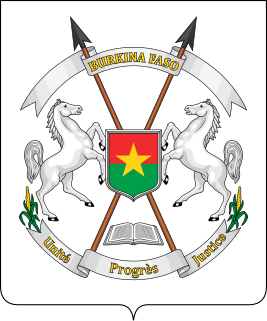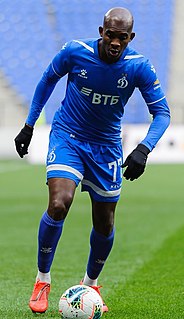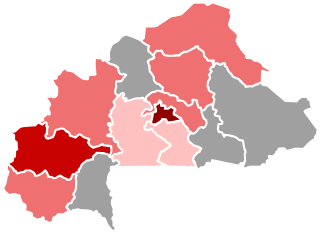| |||||
| Decades: | |||||
|---|---|---|---|---|---|
| See also: | |||||
Events in the year 1994 in Burkina Faso .
| |||||
| Decades: | |||||
|---|---|---|---|---|---|
| See also: | |||||
Events in the year 1994 in Burkina Faso .

Burkina Faso is a landlocked country in West Africa with an area of 274,200 km2 (105,900 sq mi), bordered by Mali to the northwest, Niger to the northeast, Benin to the southeast, Togo and Ghana to the south, and the Ivory Coast to the southwest. It has a population of 20,321,378. Previously called Republic of Upper Volta (1958–1984), it was renamed Burkina Faso by President Thomas Sankara. Its citizens are known as Burkinabè, and its capital and largest city is Ouagadougou.

Burkina Faso has good relations with the European Union, African and certain Asian countries. France, the former colonial power, in particular, continues to provide significant aid and supports Compaoré's developing role as a regional powerbroker.

The Burkina Faso national football team, represents Burkina Faso in men's international football and is controlled by the Burkinabé Football Federation. They were known as the Upper Volta national football team until 1984, when Upper Volta became Burkina Faso. They finished fourth in the 1998 Africa Cup of Nations, when they hosted the tournament. Their best ever finish in the tournament was the 2013 edition, reaching the final.

Arli National Park, often called Arly, is a national park located in Tapoa Province, southeastern Burkina Faso. It adjoins Benin's Pendjari National Park in the south and the Singou Reserve in the west.

Roch Marc Christian Kaboré is a Burkinabé banker and politician who served as the President of Burkina Faso from 2015 until he was deposed in 2022. He was the Prime Minister of Burkina Faso between 1994 and 1996 and President of the National Assembly of Burkina Faso from 2002 to 2012. Kaboré was also president of the Congress for Democracy and Progress (CDP) until his departure from the party in 2014. He founded the People's Movement for Progress party that same year.

According to the Government of Burkina Faso, 433,778 tourists visited the country in 2011.

The Central Bank of West African States is a central bank serving the eight west African countries which share the common West African CFA franc currency and comprise the West African Economic and Monetary Union (UEMOA):

Charles Kaboré is a Burkinabé professional footballer who plays as a defensive midfielder for French Ligue 2 club Niort and the Burkina Faso national team. A Burkina Faso international since 2006, he has become the country's most capped player.
Prostitution in Burkina Faso is not specifically prohibited by the law, but soliciting and pimping are illegal. Burkinabe society only accepts sexual intercourse within marriage. In 2009, Voice of America reported that the number of prostitutes in Burkina Faso had increased as a result of the country's poverty. The increase in prostitution has given rise to fears of an increase in the number of Burkinabés infected with HIV and AIDS. UNAIDS estimate there to be 31,000 prostitutes in the country.

Burkina Faso–Taiwan relations referred to the historical relationship between the Republic of China (Taiwan) and Burkina Faso. Taiwan had an embassy in Ouagadougou, and Burkina Faso had an embassy in Taipei. In May 2018, Burkina Faso switched to recognize the People's Republic of China, thus ending diplomatic ties with Taiwan. The last ambassador of Burkina Faso to Taiwan, appointed in August 2017, was Aminata Sana Congo.

Burkina Faso–India relations refers to the international relations that exist between Burkina Faso and India. Burkina Faso maintains an embassy in New Delhi. India maintained an embassy in Ouagadougou from November 1996 until its closure in July 2002. Currently, India maintains an honorary consulate in Ouagadougou, which functions under the jurisdiction of the High Commission of India in Accra, Ghana.

Burkina Faso–China relations refers to the foreign relations between Burkina Faso and China. Burkina Faso has an embassy in Beijing and China has an embassy in Ouagadougou.

The 1987 Burkina Faso coup d'état was a bloody military coup in Burkina Faso, which took place on 15 October 1987. The coup was organized by Captain Blaise Compaoré against incumbent far-left President Captain Thomas Sankara, his former friend and associate during the 1983 upheaval.

The COVID-19 pandemic in Burkina Faso is part of the ongoing worldwide pandemic of coronavirus disease 2019 caused by severe acute respiratory syndrome coronavirus 2. The virus was confirmed to have reached Burkina Faso on 9 March 2020. The death of Rose Marie Compaoré, a member of the National Assembly of Burkina Faso, on 18 March marked the first recorded fatality due to COVID-19 in Sub-Saharan Africa.
Rose Marie Compaoré was a Burkinabé politician and member of the Union for Progress and Reform (UPC) political party.

An ongoing war and civil conflict between the Government of Burkina Faso and Islamist rebels began in August 2015 and has led to the displacement of 1.9 million people and the deaths of at least 2,000 civilians and combatants.

A coup d'état was launched in Burkina Faso on 23 January 2022. Gunfire erupted in front of the presidential residence in the Burkinabé capital Ouagadougou and several military barracks around the city. Soldiers were reported to have seized control of the military base in the capital. However, the government denied there was an ongoing coup in the country. Several hours later, President Roch Marc Christian Kaboré was reported to have been detained by the soldiers at the military camp in the capital. On 24 January, the military announced on television that Kaboré had been deposed from his position as president. After the announcement, the military declared that the parliament, government and constitution had been dissolved. The coup d'état was led by military officer Paul-Henri Sandaogo Damiba.

Islamist insurgency in the Sahel or Jihadist Insurgencies in the Sahel refers to the Islamist insurgency in the Sahel region of West Africa following the 2011 Arab Spring to the present day. In particular, the intensive conflict in the three countries of Mali, Niger and Burkina Faso has been referred to as the Sahel War.
Capital punishment is a legal penalty in Burkina Faso. It has been abolished for all offenses except war crimes, making the country "Abolitionist for Ordinary Crimes," along with Brazil, Chile, El Salvador, Guatemala, Israel, and Peru. Before the partial abolition of capital punishment in 2018, capital punishment had been abolished de facto. Its last execution was performed in 1988.
{{cite journal}}: Cite journal requires |journal= (help)